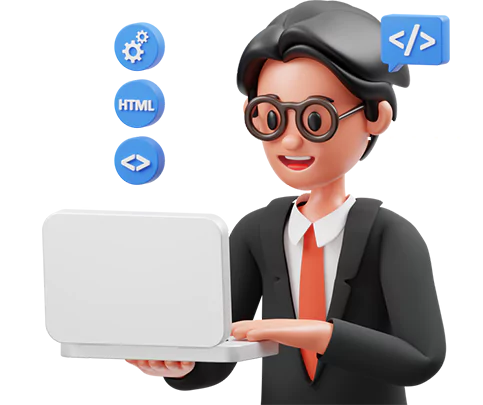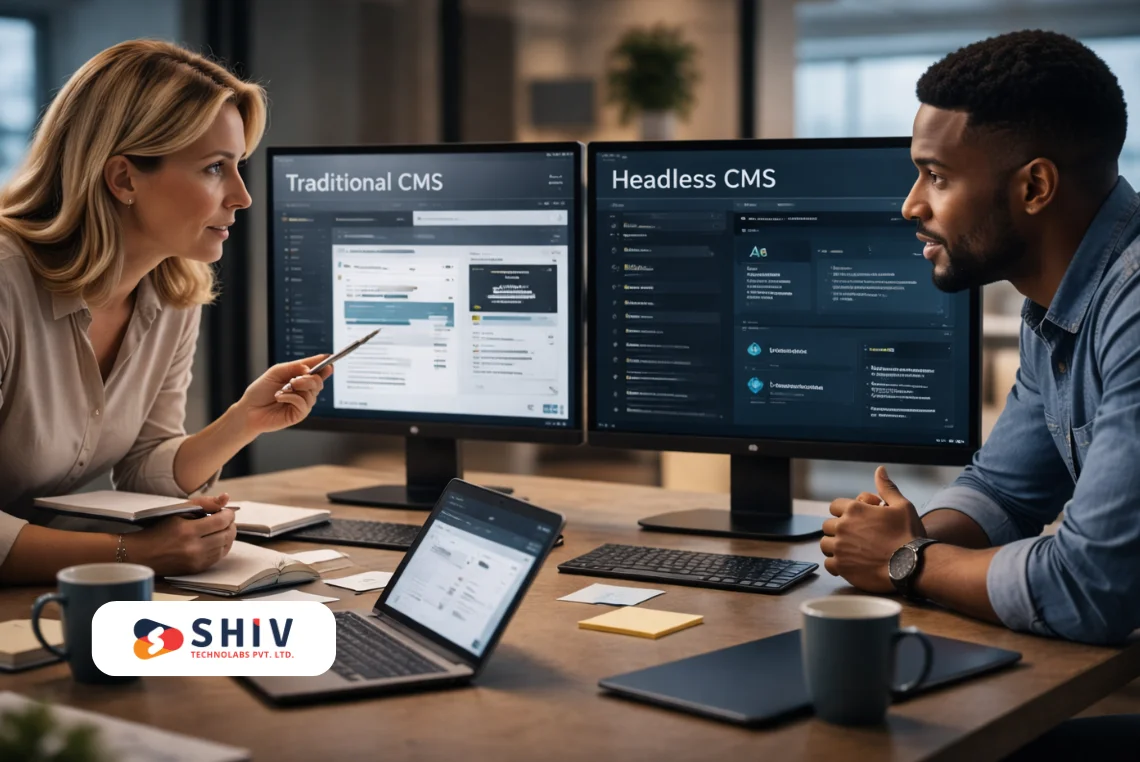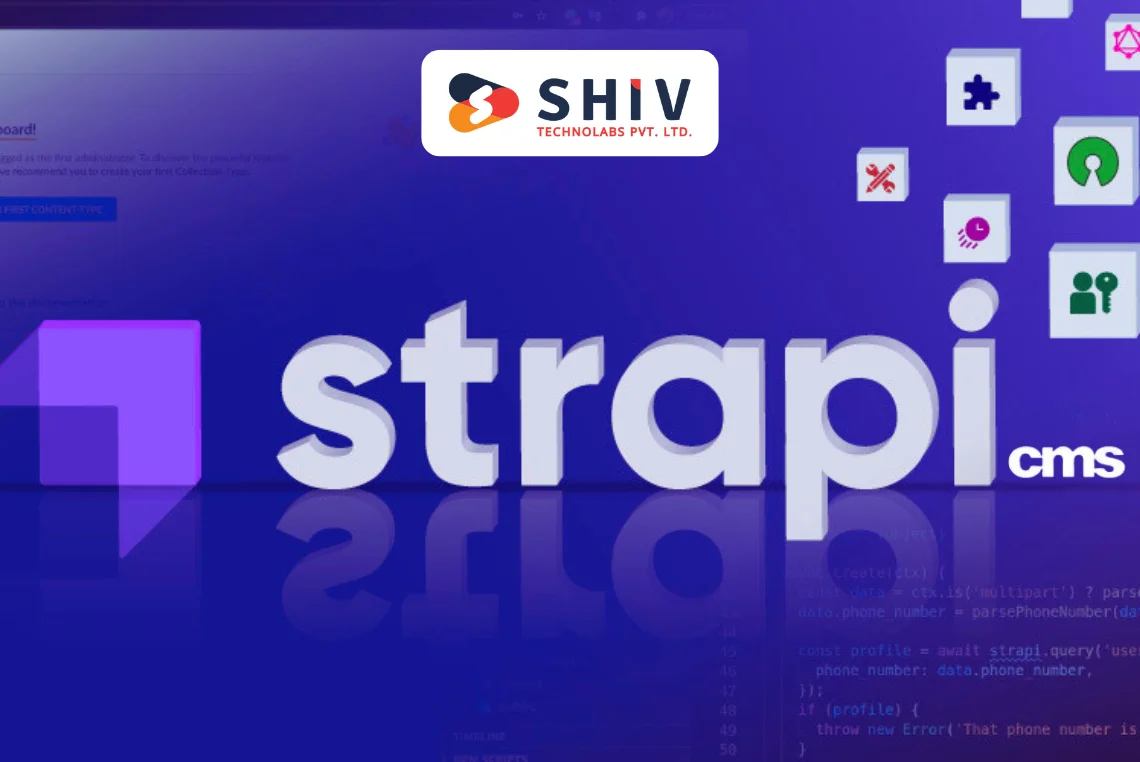Table of Contents
Managing digital content efficiently is crucial for businesses looking to provide engaging user experiences. A robust content management system (CMS) simplifies content creation, organization, and delivery. One such platform is Contentful CMS, which offers flexible content solutions tailored to modern business needs.
This article provides insights into Contentful CMS for your business, highlighting its key features, advantages, and working model. Whether you want to develop a custom website using Contentful CMS, migrate your website to Contentful CMS, or set up a Contentful CMS-powered headless eCommerce store, this guide covers everything you need to know.
What is Contentful CMS?

Contentful CMS is a headless content management system designed to manage and distribute content across multiple platforms. Unlike traditional CMS platforms that tightly integrate content with design, Contentful CMS headless content solutions allow businesses to manage content independently from front-end applications.
Instead of relying on fixed templates, Contentful provides structured content models, making it easier to customize Contentful CMS for enterprise solutions.
This flexibility allows businesses to publish content across websites, mobile apps, smart devices, and other digital platforms through API-based delivery.
Key aspects of Contentful CMS:
- Content stored in a cloud-based environment for easy access and collaboration
- API-driven content delivery, ensuring smooth integration with various applications
- Modular content structure, allowing teams to manage components independently
- Support for multiple programming frameworks, enabling developers to build custom solutions
Key Features of Contentful CMS for Modern Websites
Contentful CMS offers a flexible and API-first approach, making it a strong choice for businesses looking to manage content efficiently across multiple platforms. Unlike traditional systems, it separates content from presentation, allowing for seamless integration with various front-end technologies. Its cloud-based structure, scalability, and structured content model make it ideal for modern websites. Let’s discuss each feature of Contentful CMS.
1. Cloud-Based Content Management
Contentful CMS operates as a cloud-native platform, eliminating the need for on-premise servers. This setup allows teams to manage content from anywhere while reducing infrastructure maintenance. Businesses that want to migrate their website to Contentful CMS benefit from secure and scalable cloud storage.
2. API-First Approach
One of the standout Contentful CMS features and capabilities is its API-driven architecture. The platform provides RESTful and GraphQL APIs, allowing developers to fetch content and integrate it with various front-end applications.
Contentful CMS API integration makes it possible to connect with eCommerce platforms, mobile apps, and third-party tools. Whether building a website or an interactive application, developers can retrieve structured content through APIs without limitations.
3. Modular Content Structure
Traditional CMS platforms often store content in rigid templates, making it difficult to repurpose content for different platforms. Contentful, however, structures content in separate modules, allowing businesses to:
- Reuse content across multiple channels
- Modify specific content components without affecting other sections
- Create structured content models that align with business requirements
By adopting a modular approach, businesses can develop a custom website using Contentful CMS while maintaining consistency across all content touchpoints.
4. Role-Based Access Control
Effective collaboration requires clearly defined roles and permissions. Contentful CMS enables teams to assign user roles such as editors, developers, and administrators, ensuring that only authorized personnel can make changes to specific content areas.
5. Integration with Third-Party Applications
Businesses often rely on multiple tools for marketing, analytics, and customer relationship management. Contentful CMS supports integration with various third-party applications, including:
- E-commerce platforms like Shopify and Magento
- Analytics tools such as Google Analytics
- Marketing automation tools like HubSpot and Mailchimp
These integrations simplify content workflows and improve the ability to manage digital interactions.
6. Scalability and Performance
As businesses grow, their content needs expand. Contentful CMS ensures high performance by delivering content through globally distributed Content Delivery Networks (CDNs). This results in:
- Faster page load times
- Reduced latency for international users
- Improved site performance across multiple devices
Companies planning to set up a Contentful CMS-powered headless eCommerce store benefit from a scalable infrastructure that supports large product catalogs and dynamic content updates.
Also Read: Next.js and Headless CMS: How Can They Make Your Store Faster?
Why Choose Contentful CMS over Traditional CMS: Key Benefits

Contentful CMS offers a modern, headless architecture that allows businesses to manage and distribute content across multiple platforms efficiently. Let’s take a look at the key benefits of Contentful CMS over traditional CMS.
1. Faster Content Delivery Across Platforms
Traditional CMS platforms require extensive modifications to deliver content to different devices. With Contentful CMS headless content solutions, businesses can store content centrally and publish it across websites, mobile apps, and smart devices without reformatting.
2. Efficient Content Updates Without Affecting Design
Since content and design are managed separately, updates can be made without altering the website’s structure. This makes it easier to:
- Modify product descriptions for eCommerce stores
- Update blog content without disrupting the website layout
- Publish new content faster across multiple platforms
3. Improved Workflow for Content Teams
With structured content models and user roles, teams can work independently without waiting for developer assistance. Marketers can publish content, while developers focus on custom integrations, resulting in a more efficient content management workflow.
4. Customization for Business-Specific Needs
Businesses with unique content requirements can custom Contentful CMS integration to suit their operations. Whether managing a multi-language website, an extensive knowledge base, or an eCommerce store, Contentful CMS adapts to different use cases.
5. SEO and Performance Benefits
Contentful CMS supports structured content and clean URLs, which improve search engine rankings. The platform also ensures:
- Faster page load times due to CDN-based content delivery
- Better mobile responsiveness by serving optimized content
- Increased organic traffic through structured metadata support
These benefits make Contentful CMS a strong choice for businesses looking to improve digital experiences while maintaining high performance.
How Contentful CMS Works?
Managing content efficiently requires a system that can store, organize, and deliver information across multiple platforms without limitations. Contentful CMS work is structured around content modeling, content creation, API integration, and publishing. Here’s a breakdown of how it functions:
1. Content Modeling
A well-defined content model forms the backbone of any Contentful CMS-powered headless eCommerce store or website. Content modeling involves defining different content types, their relationships, and how they will be used across different platforms.
For example, an eCommerce store might define content models such as:
- Products – Containing product descriptions, images, and pricing
- Categories – Organizing products into structured sections
- Blog Posts – Featuring articles with metadata and tags
Since Contentful CMS follows a modular approach, businesses can create structured content that can be repurposed across multiple channels. This flexibility is useful for those looking to customize Contentful CMS for enterprise solutions.
2. Content Creation and Management
Once content models are in place, businesses can begin managing text, images, videos, and metadata through Contentful’s editor interface. Content creators can update information without affecting the design or functionality of the website.
For businesses that migrate their website to Contentful CMS, this feature simplifies content updates and ensures consistency across platforms. Teams can:
- Create structured content using predefined fields
- Edit and update content without developer involvement
- Organize assets such as images and videos within the CMS
3. API Integration and Content Delivery
Unlike traditional CMS platforms that render content within a built-in front-end framework, Contentful CMS delivers content through APIs. This approach enables businesses to integrate content into various platforms, including:
- Websites
- Mobile applications
- IoT devices
- Digital kiosks
Contentful CMS API integration allows developers to fetch data dynamically and display it in any format. Whether creating an interactive application or a custom Contentful CMS integration for a business system, Contentful ensures smooth content distribution.
4. Deployment and Content Publishing
After content creation, businesses can publish content in real-time across multiple channels. Contentful’s structured content approach allows:
- Instant updates without affecting website performance
- Multi-language support for global businesses
- Role-based approvals, ensuring content accuracy before publishing
With these capabilities, businesses can develop a custom website using Contentful CMS that meets specific industry needs while maintaining flexibility in content management.
Also Read: How to Build a Scalable CMS with React.js and Node.js?
Who Should Consider Using Contentful CMS?
Contentful CMS offers advantages for businesses of all sizes, especially those managing content across multiple digital channels. Some of the ideal use cases include:
1. Businesses Managing Omnichannel Content
Companies that publish content across websites, mobile apps, and smart devices benefit from Contentful CMS headless content solutions. Contentful’s API-based approach makes content delivery efficient and adaptable to different formats.
2. Developers Building Custom Applications
Developers looking for a scalable content management solution can use Contentful CMS API integration to build dynamic applications. Since Contentful works with multiple frameworks, it suits projects requiring flexibility and customization.
3. E-Commerce Stores Requiring Dynamic Content
Online stores with large product catalogs can set up a Contentful CMS-powered headless eCommerce store to manage their inventory efficiently. Product details, descriptions, and categories can be updated dynamically without affecting the site’s performance.
4. Enterprises Needing Custom Content Solutions
Enterprises can customize Contentful CMS for enterprise solutions to manage large volumes of content across various departments. With multi-user collaboration, role-based access, and structured workflows, businesses can streamline content management processes.
5. Businesses Seeking Contentful CMS Consultation
Companies planning to migrate their website to Contentful CMS often seek Contentful CMS consultation to determine the best approach for implementation. Professional consultation helps align CMS capabilities with business goals.
Contentful CMS vs. Traditional CMS: Key Differences
Let’s take a look at how Contentful CMS is different from traditional CMS. Traditional CMS platforms have been widely used for years, but modern businesses require headless CMS solutions like Contentful CMS to keep up with the demand for omnichannel content delivery and flexible integrations.
| Feature | Contentful CMS | Traditional CMS |
|---|---|---|
| Content Storage | Stores content as modular components | Stores content within a fixed structure |
| Separation of Content & Design | Content is independent of the front-end framework | Content is tightly linked to templates and themes |
| Reusable Content Components | Content can be repurposed across multiple platforms | Content is mostly limited to a single website |
| Content Delivery Approach | API-driven headless CMS | Page-based rendering |
| Multi-Platform Support | Supports websites, mobile apps, IoT, and more | Primarily designed for websites |
| Performance Optimization | Uses Content Delivery Networks (CDNs) and caching for faster performance | Performance depends on the hosting server and database efficiency |
| Development Frameworks | Compatible with multiple front-end frameworks (React, Angular, Vue.js, etc.) | Limited to predefined templates and themes |
| Custom Workflows | Can be tailored to fit enterprise needs | Workflows are rigid and pre-defined |
| Integration Capabilities | Can be integrated with third-party applications via APIs | Limited integration with external applications |
| Scalability | Can handle large-scale projects and high-traffic websites | Limited by hosting server capabilities |
| Global Performance | Uses a globally distributed CDN to serve content faster | Depends on hosting location and server load |
| Load Handling | Handles high traffic efficiently with API-based content delivery | Prone to slowdowns during high traffic spikes |
| Security Model | Cloud-based with enterprise-grade security measures | Dependent on hosting provider and updates |
| Software Updates | Automatic updates, reducing maintenance efforts | Requires manual updates for security patches and plugins |
| Risk of Hacking | Lower risk due to API-based architecture | Higher risk due to outdated plugins and direct database access |
| Role-Based Access | Assign custom roles for developers, editors, and marketers | Limited access control settings |
| Content Workflow | Supports advanced workflow management | Basic workflow with manual approvals |
| Multilingual Content | Built-in multi-language support | Requires additional plugins for translation management |
For those seeking Contentful CMS consultation, understanding the differences between traditional and headless CMS solutions can help determine the best approach for content management.
By adopting Contentful headless CMS advantages, businesses can future-proof their digital content strategy and create engaging experiences across multiple platforms.
Revolutionize Your Content Strategy with Shiv Technolabs’ Contentful CMS Development
Unlock the potential of Contentful CMS to redefine how your business creates, manages, and distributes content across all platforms. At Shiv Technolabs, we specialize in custom Contentful CMS integration, ensuring that your content strategy is not only scalable and flexible but also future-proof.
With our Contentful CMS development services, we empower businesses to adopt headless content solutions that deliver personalized, seamless experiences across web, mobile, and IoT devices. Whether you’re looking to migrate your website to Contentful CMS, develop a custom website, or set up a Contentful CMS-powered headless eCommerce store, our expert team has you covered.
Conclusion
Contentful CMS provides businesses with a powerful content management solution that supports scalability, flexibility, and omnichannel content distribution. Whether you want to develop a custom website using Contentful CMS, migrate your website to Contentful CMS, or set up a Contentful CMS-powered headless eCommerce store, Contentful offers a structured and efficient way to manage digital content.
At Shiv Technolabs, we are committed to helping businesses adopt Contentful CMS headless content solutions that enable them to deliver high-quality content while maintaining flexibility in content creation and distribution. Don’t let outdated content management hold back your growth. Let Shiv Technolabs help you take control of your content, simplify workflows, and reach your customers in new, innovative ways.
FAQs
1. Can I migrate my website to Contentful CMS?
Yes! If you’re currently using a traditional CMS or another content management platform, Shiv Technolabs can help you migrate your website to Contentful CMS. Our expert team will ensure a smooth transition, helping you structure your content and set up the API integrations necessary for delivering content across multiple channels.
2. How can Contentful CMS benefit my eCommerce store?
By adopting Contentful CMS-powered headless eCommerce solutions, businesses can manage product catalogs, customer data, and content independently. This ensures faster updates, a better user experience, and more flexibility in presenting content across various digital touchpoints. Whether you’re running a small online store or a large eCommerce platform, Contentful can simplify content management and improve your digital presence.
3. How can Shiv Technolabs assist with Contentful CMS development?
At Shiv Technolabs, we help companies migrate to Contentful CMS, develop custom websites, and set up headless eCommerce stores that scale with business needs.
Our expert team will ensure that your CMS solution aligns with your business goals and delivers seamless content experiences.
4. How can I get started with Contentful CMS development?
To get started with Contentful CMS development, contact Shiv Technolabs for a free consultation. Our team will guide you through the process, from defining your content strategy to integrating Contentful CMS with your existing tech stack. We will help you develop a custom website or eCommerce store and ensure that your content is delivered seamlessly across all platforms.























